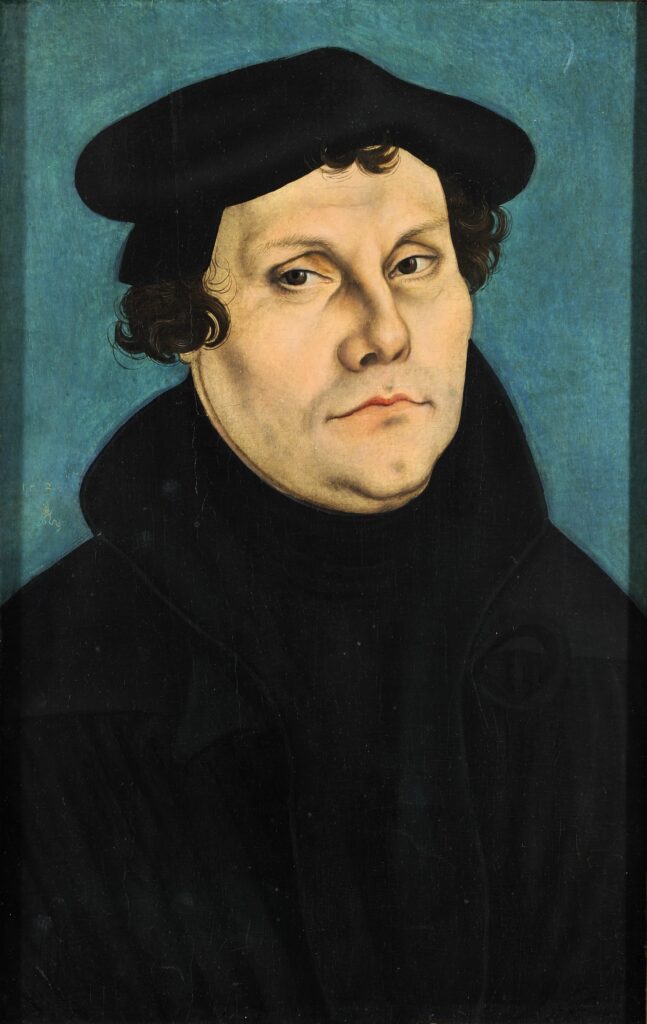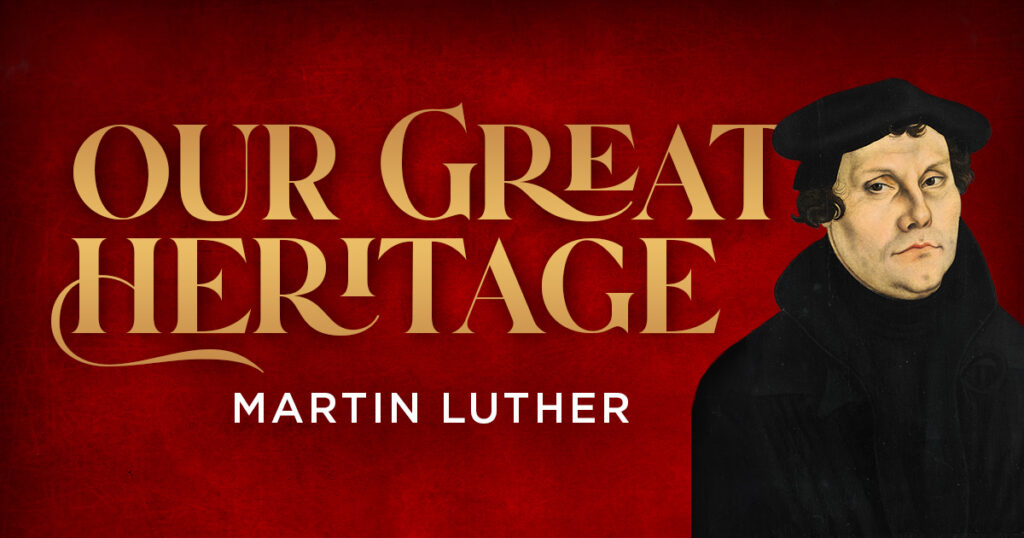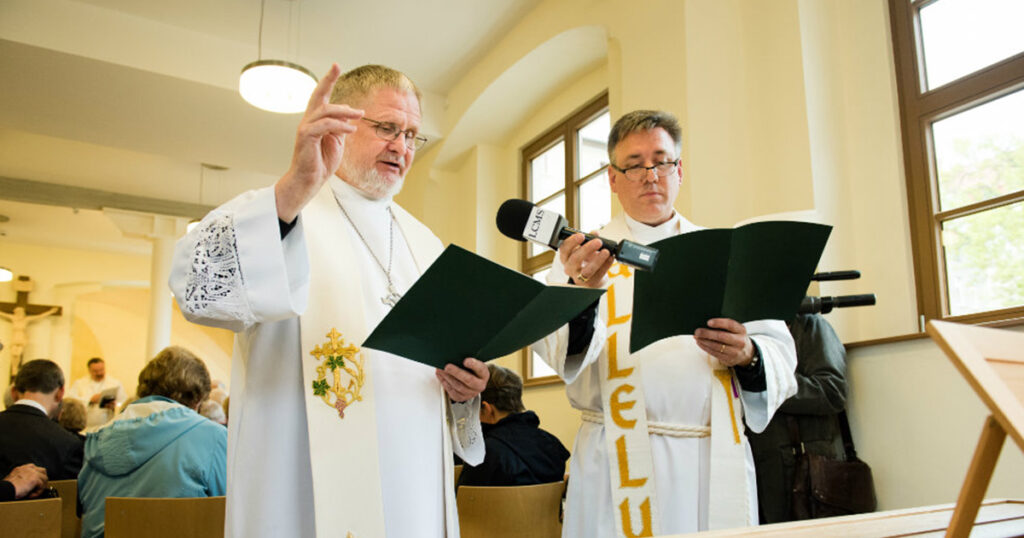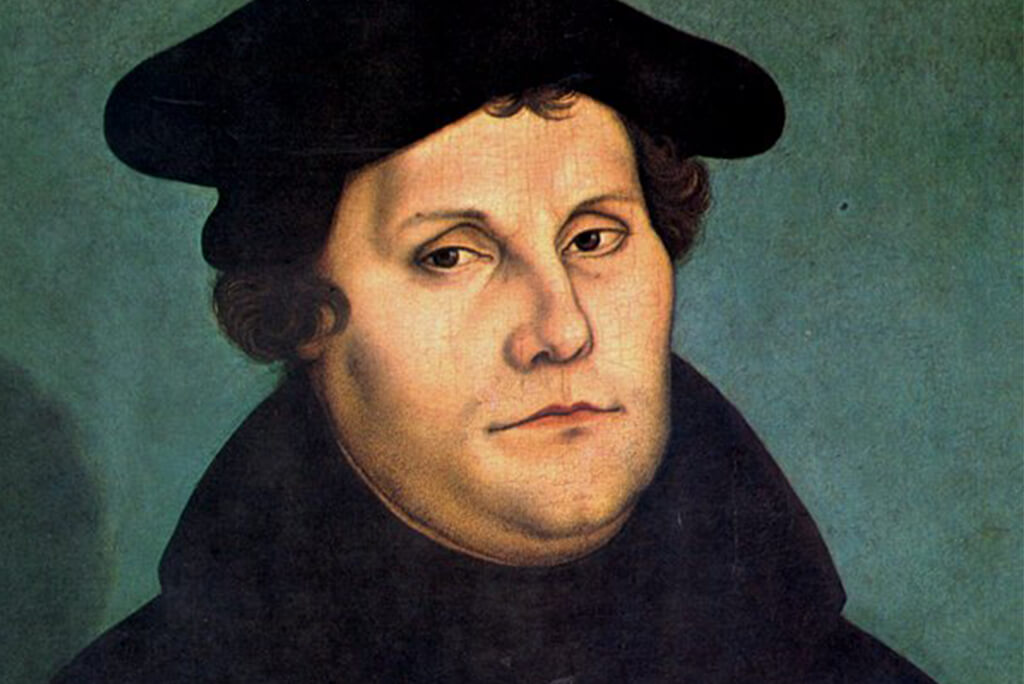Martin Luther
A.D. 1483–1546
This humble German pastor and professor sought to restore the teachings of Scripture and share the blessing of a comforted conscience.
In this series, Lutheran historian Molly Lackey will trace the history of the church, from the time of the apostles through the twentieth century. As the Body of Christ, our history transcends time, country and citizenship: “God’s Word is our great heritage.”

Imagine you have sinned (it’s probably not that hard to imagine). Maybe it was a big, public sin, an obvious-to-everybody sin. Or maybe it wasn’t. But it’s there. Lurking. You know it. More importantly, God knows it. You don’t want to keep sinning — but you do. You know that God, in His absolute perfection, cannot bear sin. So you try to deal with it. You fast and pray, you do good deeds (outwardly, anyway), you deny yourself, punish your body and mind, just trying make this sin stop and put yourself in good standing with God. But it’s not working. This sin comes back again and again and again, and you’re starting to lose hope, not in yourself (that’s long gone), but in whether or not God is actually good and loving after all, if He’s just letting you languish in your sin like this.
Now you know what it was like to be in Martin Luther’s shoes for the first 30-or-so years of his life.
From promising lawyer to anguished monk
Martin Luther was born in 1483 to a middle-class family. His father wanted him to go to school to become a lawyer in order to help with their growing family business. The young Luther was a gifted student progressing successfully through this plan for his life — until in July 1505 at age 21, seemingly out of the blue, he dropped out of law school, sold his things, and entered the monastery to become an Augustinian friar. In the background, the young Luther had probably been undergoing a long, slow crisis in his faith — one that continued for quite a while even after becoming a monk. While he was becoming increasingly dissatisfied with his studies and increasingly interested in Scripture, he was caught in a thunderstorm on horseback one evening, and swore that if St. Anne (Mary’s mother, according to tradition) saved him, he would become a monk. He kept this promise.
In the monastery, Brother Martin grew in knowledge and in terror over his own sin and God’s judgment. He was encouraged to pursue additional education in order to help quiet his fears or at least give him a distraction from his constant sense of guilt, which was so strong he engaged in self-flagellation — whipping himself — and other torments in an attempt to punish himself and curb his sin. He eventually earned a doctorate and went to teach at the newly-opened university in Wittenberg, Germany.
The troubled Luther was rocketed to international notoriety in 1517 when he published his 95 Theses, 95 statements meant for debate among university scholars and clergy on a number of theological topics. Many of these dealt with the practice of selling plenary indulgences — full remittance of punishments for all sins, functionally a “get-out-of-purgatory” card — to raise funds to build and decorate St. Peter’s Basilica in Rome. Although it dealt with insider issues, the document “went viral,” circulating across Europe rapidly due to recent innovations in moveable type printing like the Gutenberg press.
Luther’s Gospel breakthrough
Luther describes his greatest doctrinal breakthrough taking place in 1519 in what is now referred to as his “Tower Experience.” While reading his Bible in a tower one evening, Luther finally found the answer from Scripture to his intense spiritual and psychological distress: God’s righteousness is imputed to Christians by grace through faith in Christ, not through anything we do on our own.
This renewed understanding of the Gospel — an understanding attested to in Scripture and by the early church fathers — formed the basis for Luther’s reformation theology. It is why Luther refocused the sacramental system on how God comes to us through physical means to give us grace, why he reformed the worship service to point the believer to Christ’s work for him, why he wrote and wrote and wrote, until he was found to be a heretic at the Diet of Worms in 1523 — where he famously confessed that he had to stand by Scriptures and his conscience, even if the world was against him. It’s also why he kept writing, from translating the entire Bible into German from the original Greek and Hebrew beginning in 1523 — the first such translation into a common (or vernacular) language — to the Small and Large Catechisms in 1529.
There is a great deal more to be said about Martin Luther and his life and work, but we can’t fit it all here. After all, by his death in 1546, he was the most prolific writer of his day and the first best-selling author! But it is very important for us to remember, especially as Lutherans (a name foisted on his followers by his enemies, not chosen by the man himself), what Luther was about. Martin Luther was not a revolutionary — he wasn’t trying to start his own church, and he was, in fact, deeply upset by the chaos, division and bloodshed caused by the Protestant Reformation. He was Professor Luther — Pastor Luther — Martin, a man with a conscience that was burdened by false and misleading teachings common in the church of his day. He went prayerfully and thoughtfully to Scripture to try to find answers to his terror of God and soul-deep anxiety, and what he found there was Jesus, loving little Martin and all mankind unto death and rising to bring eternal life to all who trust in Him.
This was no new teaching, no philosophical trend or emotional projection, though it surely did have philosophical and emotional ramifications at the individual and cultural level. It was a restoration of the faith rightly taught and whole-heartedly believed by those people who come before and after Luther in this series and in the vast, mostly-uncharted waters of the church’s history. Our inheritance from Martin Luther is the clear confession that Jesus alone — not my works, thoughts, feelings, words, money, or anything else — saves me from my sin.
Editor’s Note: The next installment of this series, on the great lady of the Reformation Katharina von Bora Luther, will be posted two weeks from today. Check back then or follow us on social media to catch it!
Image: “Portrait of Martin Luther,” Lucas Cranach, 1528.






As much as Luther’s impact on the Reformation and Christianity is without doubt a milestone in the life of the church, I believe no one man or woman of our fallen species can be placed on a pedestal. It is more honest and truthful to examine Luther’s life and work correctly, giving credit where it is due, and noting the shortcomings which impeded or diminished his best efforts. Luther’s own words describe his feelings on a host of subjects, and these are known by scholars and students alike who have plumbed the massive writings he produced. His often rash comments, and railings against the Jews in his published writings do not reflect the teachings of Our Lord, or the spirit of Christ toward those blinded in unbelief. In his provocative speech he advanced antisemitic rhetoric which others used as justification for despising the Jews. His encouragement of the German princes in brutally suppressing the peasant revolt and upheavals of his day effectively aided the Counter Reformation, by driving more Germans back into Catholicism. No man is perfect, the best of men are not always at their best, and Luther was no exception. All have sinned and fall short of the glory of God. When we speak of the history of Luther and the Reformation, we owe it to history to be forthcoming and understand it in all aspects, lest we paint an incomplete picture. Soli Deo Gloria
The sale of indulgences made justification too expensive and sanctification too cheap. Luther’s 95 Theses identified both difficulties, and he succinctly stated in his October 1517 letter to Archbishop Albrecht that “indulgences confer on us no good gift, either for salvation or for sanctity.”
Of course we celebrate that from the Reformation re-emerged with resounding clarity the life-giving good news that Jesus fully paid the price for our justification. Perhaps, in these permissive times, we might more deliberately acknowledge the dangers of presuming upon God’s grace and highlight the good news that we are not only forgiven but have been saved into a holy calling — a costly but fulfilling way of life by which we are blessed and God is glorified this side of heaven (2 Cor. 5:15, Eph. 2:10, Titus 2:14, 1 Peter 2:9).